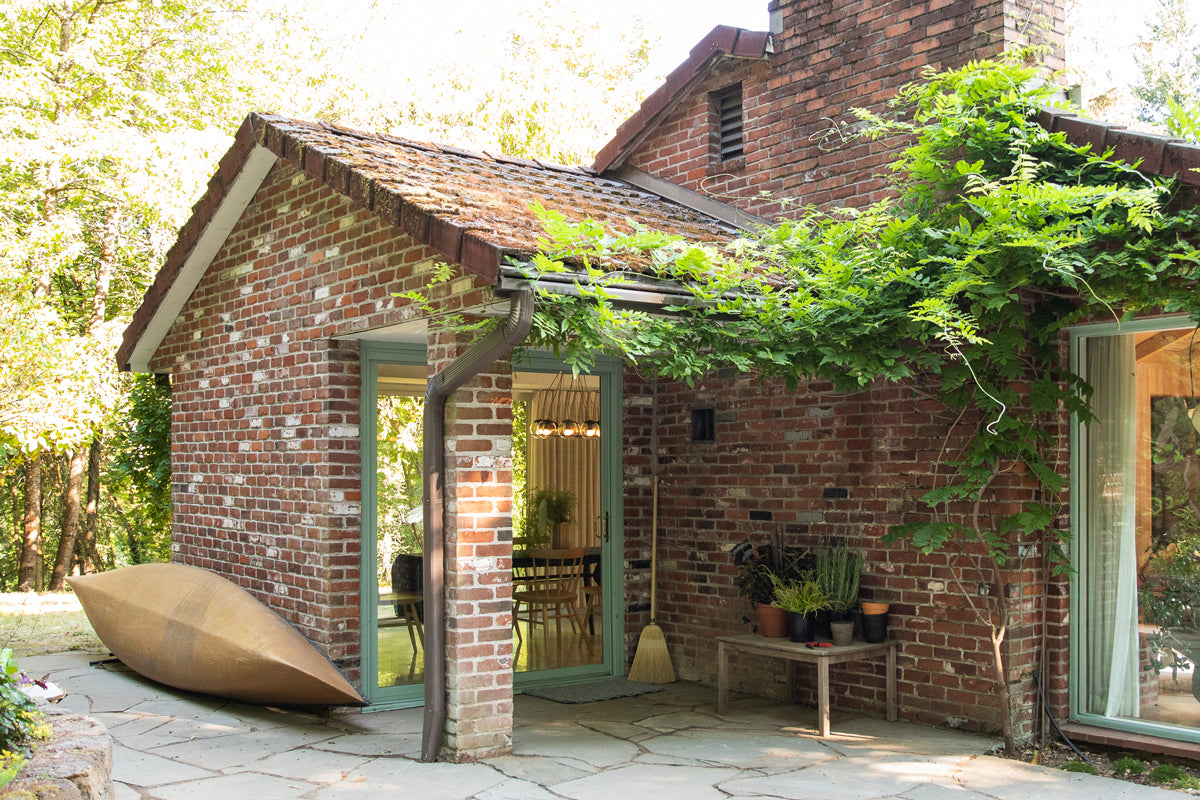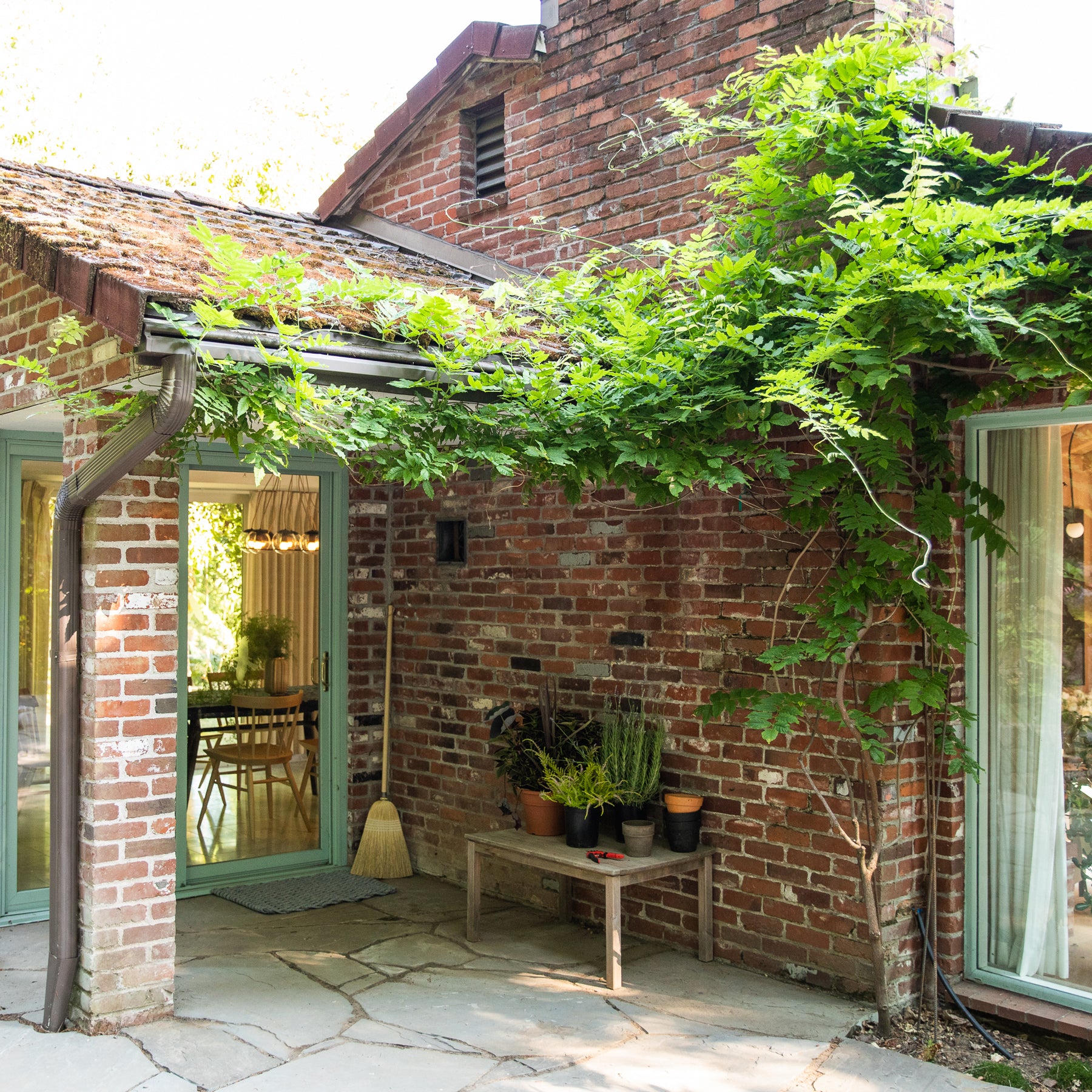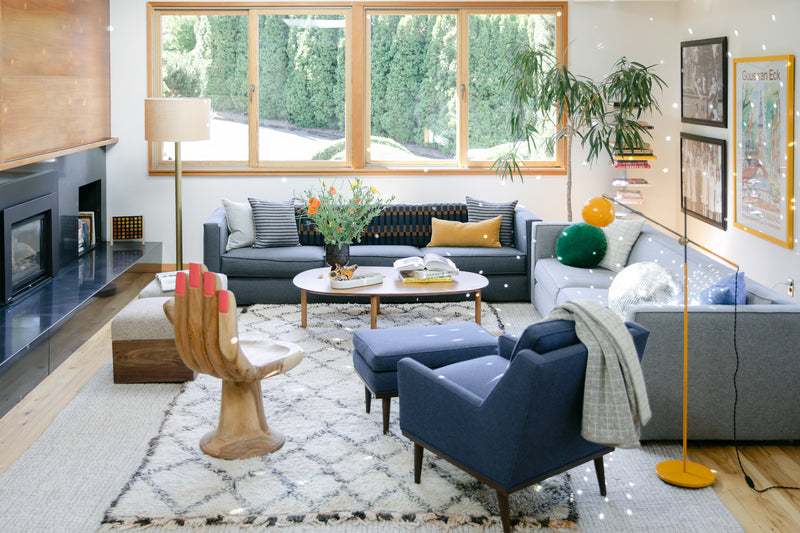Behind the Scenes: The Wingate Home in Portland, Oregon

Nestled in Portland’s 5,300-acre urban nature preserve, Forest Park, sits the Wingate family home – a 1955 architect-built single-story house on two acres of land. Filled with family heirlooms, found vintage pieces, and art at every turn, each carefully collected object tells the tale of an exceptionally and fully lived life and we could think of no better backdrop to capture our latest Fall collection.
Beautiful, lively, and full of character, it’s clear to see that Jessica, her husband Hannes, and their daughter Ivy have created a home where inspiration and original expression abound. Finding ourselves enamored by their stunning space and the story behind it, we spent some time with Jessica to hear more about her design influences, artistic process, and the ups and downs of navigating the past year as a family of three.

Tell us about your home. How did you find it, and how did you know it was the right one for you?
We purchased the home on a whim in 2016, feeling that there was lots of interesting potential with the house and the land. How the house sat in the landscape, the quality of the construction, and the perfect balance between city and forest – we knew these factors were nearly impossible to replicate, so we made the move. We were not in the market and not excited about another house project, but we wanted our daughter Ivy to have the freedom to roam and explore in nature and felt like it needed to happen.
The house is a 1955 single-owner architect-built home on a little over two acres of land. We are tucked into Forest Park with one visible neighbor and only about three minutes from downtown Portland. The location mirrors my husband and me and our respective backgrounds perfectly.

Could you share a bit about your background + family?
I’m a hopeless cosmopolitan. My father was a diplomat for the US Embassy, and my mother grew up in Ireland and Australia and traveled extensively in her life before meeting him. Spending my early years living and traveling overseas fostered a sense of adventure and curiosity that I consider one of the greatest gifts they’ve given me. Exposure to different cultures, cuisine, languages, celebrations, and ways of being and working was incredibly formative and has absolutely set the tone for my adult life. It has also very much set the stage for my interest in design and business.

I met my husband Hannes while living in San Sebastian, Spain, teaching English in the late ’90s. He was studying Spanish, taking a break from the dark Swedish winters. He grew up unconventionally – living immersed in nature on the West Coast of Sweden to bohemian intellectual artist parents who worked in photography and film. Hannes graduated from Central St Martins College of Art in London and has a past with leading design firms in the US and Sweden. He works internationally as a land artist/creative director and sometimes teaches wilderness survival in the Utah desert.


Where did you draw inspiration from in designing your home?
As creatives, it's hard to discern sources of inspiration clearly. One big piece of the puzzle is the site and the house itself – the way the house sat on the land, how it was oriented, and how the landscaping had been done, held a lot of potentials that could be released with a few strategic interventions.
As is often the case with older homes, the details were designed around different social and cultural conventions (that no longer serve how we live today). We took down some walls and opened up the windows to let more light in and allow better flow, connectivity, and functionality. In terms of style and feel, we are both much of the British aristocratic school of decorating.
“Be learned, curious and discerning. Buy what you love, and it will all come together beautifully, if eccentrically.”
What makes a house a home to you?
Home for me is ever-changing. It is the life and activity that makes a home, not the objects or materials. This is often forgotten. For us, our home needs to feel lived in, with projects in various stages of completion, spaces where we regularly re-organize furniture and art to shift the energy or mood. There needs to be freedom to be and to create. To be practical while still providing shelter and warmth.
Oftentimes, it’s the slow, everyday moments that are the most memorable! What are some things you and your family enjoy doing together at home?
What makes a house truly a home and what human beings enjoy doing together are often the same thing. This is true for us in our home. Getting up and making tea, starting a fire, and cooking breakfast. Having a horde of Ivy’s friends over playing dress-up or war in the forest. Gardening with the doors open while the cats sleep in the sunshine. Playing the piano to unwind after a long day.


When it comes to interiors, how do you personally strike the balance between old and new?
Both Hannes and I have a lot of reverence for beautifully designed and well-made objects. This feeling transcends time and trends. Quality, well-resolved design, and beauty have great staying power, and if you rely on that as the underlying qualities, that is what unifies an interior no matter what time period the piece is from. Confidently mixing objects with these criteria (guided by personal taste) is what makes a good interior that can stand the test of time.

We are acutely aware of how the capitalist economy has embraced built-in obsolescence and how this is part of the environmental crisis. Being able to live with old and new is an antidote. This is why we feel particularly good finding a vintage piece and giving it new life and often a contemporary twist.
"Ultimately resisting temporal trends and going your own way is subversive and communicates authenticity. And at the end of the day, nothing is more ‘cool’ than authenticity."

What first struck us when we walked into your space was the amount of beautiful original art in your home. What role has art played for your family?
Art has always played a big part in both of our upbringings and naturally in our life together. Many of the objects we have collected over the years are objects of nature or taken from nature and made into different pieces like the slab tables Hannes made. We don’t create boundaries to what we consider art and what we don’t, and all three of us use our house as a gallery for ideas, inspiration, and expression.

My litmus test for whether something would fit in our home is “could you find it down the rabbit hole?” That gives us all a lot of space and freedom. Art is a form of storytelling. If you bring it into your home, whether natural artifact, painting, sculpture, or photography, together these works spin yarns of stories that become a tale.
“Being a collector means asking yourself what tale do you want to be part of? Following the threads of that story will produce an interesting life and, as a side effect, an interesting home.”

Are there any designers, artists, key leaders that have influenced and inspired your life philosophy or creative choices?
I tend to appreciate people who are rebellious, blaze their own trails, ask themselves hard questions, and don’t cut corners with their vision. I like people that are unapologetically themselves as that type of spirit breaks up our enforced ordinary reality and allows more room for all of us to be more authentic and free.
A few people that come to mind are Dolly Parton, Diane Von Furstenberg, David Shrigley, Gio Ponti, Patti Smith, Sergei Polunin, Emilio Pucci, Piero Fornasetti, Josef Frank, Joseph Beuys. I’d be remiss if I did not include my mother-in-law, Swedish photographer Agneta Ekman. But no one more than my husband, Hannes. His encouragement to live a full life and take our pleasures and curiosities extremely seriously has been the best rabbit hole to fall down.

How did you get to where you are today as founder of Le Cou?
Career-wise I have been involved in design since my early 20’s when I lived in London working for a well-known vintage furniture dealer. I learned all about the art of selection and the power of names, and it set me off on my career with a lot of valuable experience.
I have no formal background in a specific design discipline, but I have been cultivating my eye, interests, and ideas for as long as I can remember – sometimes taking the more worn path working for retailers like Design Within Reach and Rejuvenation, while other times, going at it alone and consulting for boutique hedge fund companies, multiple venture back design startups, and cultivating my ideas starting a few small companies including Le Cou.


We have to ask about your home library. It’s simply incredible. Could you share a bit more about your collection and the decision to dedicate a room to reading?
Books are probably the thing that we own the most of, and that's not likely to ever change. We try to keep them in a few rooms, but they’re always traveling around and stacking up.
"Beyond the inherent beauty in a room full of books, it’s a reminder that there is so much to learn, experience, and explore. This is one of the greatest aspects of being alive right now: the incredible access to knowledge is unparalleled in history."

The library I put together as a birthday present for Hannes. It was our old office we shared and no longer used. I gathered all his favorite books he’s read and all the ones I know he’s trying to carve time out to read and created a personal study for him. Everything in the room, from the art, to the furniture to the objects, felt like they were charged with who he was, who he currently is, and who he is becoming. Putting it all together felt important, not to mention illuminating. You think you know someone because you have been together for 20 years, but the exercise of channeling your partner and his hopes and dreams while at the same time removing yourself was such a good exercise.

Last but not least, what’s one thing you’ve come to appreciate about being at home so much this past year?
It’s obviously been a quieter year than normal with very few trips and much, much less entertaining, but it still feels like not a lot has changed for us. Hannes and I have both worked on and off from home, so the main difference (which was a delight) was being able to spend so much more time with our 9-year-old daughter, Ivy.
We were fortunate enough to hire a full-time Waldorf teacher with a small pod of likeminded friends and started our own little school. This created great community and continuity for our children and kept the parents sane at the same time. Hearing all the singing, horrid attempts at playing the flute, and laughter brought us more joy than we could have ever anticipated and filled us up in ways that dining out or going to a show just couldn’t.

Another thing we’ve all appreciated is the land around our house and having space to breathe and recharge. We worked a lot in our garden building patios, rock walls, planting new beds, moving plants to try out different combinations. It will never be highly groomed, but we’re working on curating the wildness and learning what it wants to do. From that perspective, the slowness of each season gave us a lot of time to contemplate what to do in the forest.





